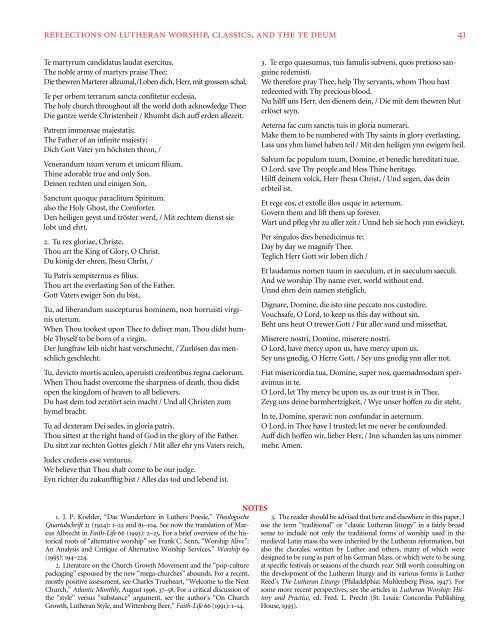05-4 Theology of the..
05-4 Theology of the..
05-4 Theology of the..
Create successful ePaper yourself
Turn your PDF publications into a flip-book with our unique Google optimized e-Paper software.
REFLECTIONS ON LUTHERAN WORSHIP, CLASSICS, AND THE TE DEUM 41<br />
Te martyrum candidatus laudat exercitus.<br />
The noble army <strong>of</strong> martyrs praise Thee;<br />
Die <strong>the</strong>wren Marterer allzumal,/Loben dich, Herr, mit grossem schal,<br />
Te per orbem terrarum sancta confitetur ecclesia,<br />
The holy church throughout all <strong>the</strong> world doth acknowledge Thee:<br />
Die gantze werde Christenheit / Rhumbt dich auff erden allezeit.<br />
Patrem immensae majestatis;<br />
The Fa<strong>the</strong>r <strong>of</strong> an infinite majesty;<br />
Dich Gott Vater ym höchsten thron, /<br />
Venerandum tuum verum et unicum filium.<br />
Thine adorable true and only Son.<br />
Deinen rechten und einigen Son,<br />
Sanctum quoque paraclitum Spiritum.<br />
also <strong>the</strong> Holy Ghost, <strong>the</strong> Comforter.<br />
Den heiligen geyst und tröster werd, / Mit rechtem dienst sie<br />
lobt und ehrt.<br />
2. Tu rex gloriae, Christe.<br />
Thou art <strong>the</strong> King <strong>of</strong> Glory, O Christ.<br />
Du könig der ehren, Jhesu Christ, /<br />
Tu Patris sempiternus es filius.<br />
Thou art <strong>the</strong> everlasting Son <strong>of</strong> <strong>the</strong> Fa<strong>the</strong>r.<br />
Gott Vaters ewiger Son du bist,<br />
Tu, ad liberandum suscepturus hominem, non horruisti virginis<br />
uterum.<br />
When Thou tookest upon Thee to deliver man, Thou didst humble<br />
Thyself to be born <strong>of</strong> a virgin.<br />
Der Jungfraw leib nicht hast verschmecht, / Zurlösen das menschlich<br />
geschlecht.<br />
Tu, devicto mortis aculeo, aperuisti credentibus regna caelorum.<br />
When Thou hadst overcome <strong>the</strong> sharpness <strong>of</strong> death, thou didst<br />
open <strong>the</strong> kingdom <strong>of</strong> heaven to all believers.<br />
Du hast dem tod zerstört sein macht / Und all Christen zum<br />
hymel bracht.<br />
Tu ad dexteram Dei sedes, in gloria patris.<br />
Thou sittest at <strong>the</strong> right hand <strong>of</strong> God in <strong>the</strong> glory <strong>of</strong> <strong>the</strong> Fa<strong>the</strong>r.<br />
Du sitzt zur rechten Gottes gleich / Mit aller ehr yns Vaters reich,<br />
Judex crederis esse venturus.<br />
We believe that Thou shalt come to be our judge.<br />
Eyn richter du zukunfftig bist / Alles das tod und lebend ist.<br />
3. Te ergo quaesumus, tuis famulis subveni, quos pretioso sanguine<br />
redemisti.<br />
We <strong>the</strong>refore pray Thee, help Thy servants, whom Thou hast<br />
redeemed with Thy precious blood.<br />
Nu hilff uns Herr, den dienern dein, / Die mit dem <strong>the</strong>wren blut<br />
erlöset seyn.<br />
Aeterna fac cum sanctis tuis in gloria numerari.<br />
Make <strong>the</strong>m to be numbered with Thy saints in glory everlasting.<br />
Lass uns yhm himel haben teil / Mit den heiligen ynn ewigem heil.<br />
Salvum fac populum tuum, Domine, et benedic hereditati tuae.<br />
O Lord, save Thy people and bless Thine heritage.<br />
Hilff deinem volck, Herr Jhesu Christ, / Und segen, das dein<br />
erbteil ist.<br />
Et rege eos, et extolle illos usque in aeternum.<br />
Govern <strong>the</strong>m and lift <strong>the</strong>m up forever.<br />
Wart und pfleg yhr zu aller zeit / Unnd heb sie hoch ynn ewickeyt.<br />
Per singulos dies benedicimus te;<br />
Day by day we magnify Thee.<br />
Teglich Herr Gott wir loben dich /<br />
Et laudamus nomen tuum in saeculum, et in saeculum saeculi.<br />
And we worship Thy name ever, world without end.<br />
Unnd ehrn dein namen stetiglich.<br />
Dignare, Domine, die isto sine peccato nos custodire.<br />
Vouchsafe, O Lord, to keep us this day without sin.<br />
Beht uns heut O trewer Gott / Für aller sund und missethat.<br />
Miserere nostri, Domine, miserere nostri.<br />
O Lord, have mercy upon us, have mercy upon us.<br />
Sey uns gnedig, O Herre Gott, / Sey uns gnedig ynn aller not.<br />
Fiat misericordia tua, Domine, super nos, quemadmodum speravimus<br />
in te.<br />
O Lord, let Thy mercy be upon us, as our trust is in Thee.<br />
Zeyg uns deine barmhertzigkeit, / Wye unser h<strong>of</strong>fen zu dir steht.<br />
In te, Domine, speravi: non confundar in aeternum.<br />
O Lord, in Thee have I trusted; let me never be confounded.<br />
Auff dich h<strong>of</strong>fen wir, lieber Herr, / Inn schanden las uns nimmer<br />
mehr. Amen.<br />
1. J. P. Koehler, “Das Wunderbare in Lu<strong>the</strong>rs Poesie,” Theologische<br />
Quartalschrift 21 (1924): 1–22 and 81–104. See now <strong>the</strong> translation <strong>of</strong> Marcus<br />
Albrecht in Faith-Life 66 (1993): 2–23. For a brief overview <strong>of</strong> <strong>the</strong> historical<br />
roots <strong>of</strong> “alternative worship” see Frank C. Senn, “Worship Alive”:<br />
An Analysis and Critique <strong>of</strong> Alternative Worship Services,” Worship 69<br />
(1995): 194–224.<br />
2. Literature on <strong>the</strong> Church Growth Movement and <strong>the</strong> “pop-culture<br />
packaging” espoused by <strong>the</strong> new “mega-churches” abounds. For a recent,<br />
mostly positive assessment, see Charles Trueheart, “Welcome to <strong>the</strong> Next<br />
Church,” Atlantic Monthly, August 1996, 37–58. For a critical discussion <strong>of</strong><br />
<strong>the</strong> “style” versus “substance” argument, see <strong>the</strong> author’s “On Church<br />
Growth, Lu<strong>the</strong>ran Style, and Wittenberg Beer,” Faith-Life 66 (1991): 1–14.<br />
NOTES<br />
3. The reader should be advised that here and elsewhere in this paper, I<br />
use <strong>the</strong> term “traditional” or “classic Lu<strong>the</strong>ran liturgy” in a fairly broad<br />
sense to include not only <strong>the</strong> traditional forms <strong>of</strong> worship used in <strong>the</strong><br />
medieval Latin mass tha were inherited by <strong>the</strong> Lu<strong>the</strong>ran reformation, but<br />
also <strong>the</strong> chorales, written by Lu<strong>the</strong>r and o<strong>the</strong>rs, many <strong>of</strong> which were<br />
designed to be sung as part <strong>of</strong> his German Mass, or which were to be sung<br />
at specific festivals or seasons <strong>of</strong> <strong>the</strong> church year. Still worth consulting on<br />
<strong>the</strong> development <strong>of</strong> <strong>the</strong> Lu<strong>the</strong>ran liturgy and its various forms is Lu<strong>the</strong>r<br />
Reed’s The Lu<strong>the</strong>ran Liturgy (Philadelphia: Muhlenberg Press, 1947). For<br />
some more recent perspectives, see <strong>the</strong> articles in Lu<strong>the</strong>ran Worship: History<br />
and Practice, ed. Fred. L. Precht (St. Louis: Concordia Publishing<br />
House, 1993).
















